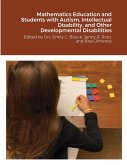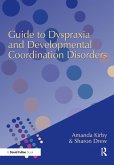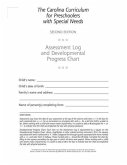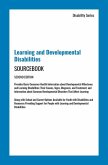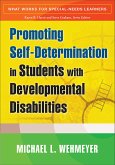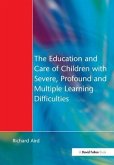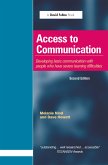A Comprehensive Guide to Intellectual and Developmental Disabilities
Herausgeber: Wehmeyer, Michael L; Shogren, Karrie A; Fung, W L Alan; Percy, Maire; Brown, Ivan
Schade – dieser Artikel ist leider ausverkauft. Sobald wir wissen, ob und wann der Artikel wieder verfügbar ist, informieren wir Sie an dieser Stelle.
A Comprehensive Guide to Intellectual and Developmental Disabilities
Herausgeber: Wehmeyer, Michael L; Shogren, Karrie A; Fung, W L Alan; Percy, Maire; Brown, Ivan
- Gebundenes Buch
- Merkliste
- Auf die Merkliste
- Bewerten Bewerten
- Teilen
- Produkt teilen
- Produkterinnerung
- Produkterinnerung
The most complete book available on children and adults with intellectual and developmental disabilities, this core textbook is perfect for any course focused on disabilities.
Andere Kunden interessierten sich auch für
![Mathematics Education and Students with Autism, Intellectual Disability, and Other Developmental Disabilities Mathematics Education and Students with Autism, Intellectual Disability, and Other Developmental Disabilities]() Mathematics Education and Students with Autism, Intellectual Disability, and Other Developmental Disabilities26,99 €
Mathematics Education and Students with Autism, Intellectual Disability, and Other Developmental Disabilities26,99 €![Guide to Dyspraxia and Developmental Coordination Disorders Guide to Dyspraxia and Developmental Coordination Disorders]() Amanda KirbyGuide to Dyspraxia and Developmental Coordination Disorders152,99 €
Amanda KirbyGuide to Dyspraxia and Developmental Coordination Disorders152,99 €![The Carolina Curriculum for Preschoolers with Special Needs (Ccpsn) Assessment Log and Developmental Progress Chart The Carolina Curriculum for Preschoolers with Special Needs (Ccpsn) Assessment Log and Developmental Progress Chart]() Nancy Johnson-MartinThe Carolina Curriculum for Preschoolers with Special Needs (Ccpsn) Assessment Log and Developmental Progress Chart33,99 €
Nancy Johnson-MartinThe Carolina Curriculum for Preschoolers with Special Needs (Ccpsn) Assessment Log and Developmental Progress Chart33,99 €![Learning and Developmental Disabilities Sourcebook, Second Edition Learning and Developmental Disabilities Sourcebook, Second Edition]() Learning and Developmental Disabilities Sourcebook, Second Edition42,99 €
Learning and Developmental Disabilities Sourcebook, Second Edition42,99 €![Promoting Self-Determination in Students with Developmental Disabilities Promoting Self-Determination in Students with Developmental Disabilities]() Michael L WehmeyerPromoting Self-Determination in Students with Developmental Disabilities52,99 €
Michael L WehmeyerPromoting Self-Determination in Students with Developmental Disabilities52,99 €![The Education and Care of Children with Severe, Profound and Multiple Learning Disabilities The Education and Care of Children with Severe, Profound and Multiple Learning Disabilities]() Richard AirdThe Education and Care of Children with Severe, Profound and Multiple Learning Disabilities152,99 €
Richard AirdThe Education and Care of Children with Severe, Profound and Multiple Learning Disabilities152,99 €![Access to Communication Access to Communication]() Melanie NindAccess to Communication153,99 €
Melanie NindAccess to Communication153,99 €-
-
-
The most complete book available on children and adults with intellectual and developmental disabilities, this core textbook is perfect for any course focused on disabilities.
Produktdetails
- Produktdetails
- Verlag: Brookes Publishing Company
- 2nd edition
- Seitenzahl: 784
- Erscheinungstermin: 26. Januar 2017
- Englisch
- Abmessung: 282mm x 221mm x 41mm
- Gewicht: 2018g
- ISBN-13: 9781598576023
- ISBN-10: 159857602X
- Artikelnr.: 44944789
- Herstellerkennzeichnung
- Libri GmbH
- Europaallee 1
- 36244 Bad Hersfeld
- gpsr@libri.de
- Verlag: Brookes Publishing Company
- 2nd edition
- Seitenzahl: 784
- Erscheinungstermin: 26. Januar 2017
- Englisch
- Abmessung: 282mm x 221mm x 41mm
- Gewicht: 2018g
- ISBN-13: 9781598576023
- ISBN-10: 159857602X
- Artikelnr.: 44944789
- Herstellerkennzeichnung
- Libri GmbH
- Europaallee 1
- 36244 Bad Hersfeld
- gpsr@libri.de
Michael L. Wehmeyer, Ph.D. is Professor of Special Education; Director, Kansas University Center on Developmental Disabilities; and Senior Scientist, Beach Center on Disability, all at the University of Kansas. He has published more than 25 books and 250 scholarly articles and book chapters on topics related to self-determination, special education, intellectual disability, and eugenics. He is s co-author of the widely used textbook Exceptional Lives: Special Education in Today's Schools, published by Merrill/Prentice Hall, now in its 7th Edition. His most recent book, co-authored with J. David Smith, is Good Blood, Bad Blood: Science, Nature, and the Myth of the Kallikaks, published by the American Association on Intellectual and Developmental Disabilities (AAIDD). Dr. Wehmeyer is Past-President (2010-2011) of the Board of Directors for and a Fellow of AAIDD; a past president of the Council for Exceptional Children's Division on Career Development and Transition (DCDT); a Fellow of the American Psychological Association (APA), Intellectual and Developmental Disabilities Division (Div. 33); a Fellow of the International Association for the Scientific Study of Intellectual and Developmental Disabilities (IASSIDD); and former Editor-in-Chief of the journal Remedial and Special Education. He is a co-author of the AAIDD Supports Intensity Scale, and the 2010 AAIDD Intellectual Disability Terminology, Classification, and Systems of Supports Manual. Ivan Brown has worked in, and contributed to, the field of disabilities for the past 25 years. He began his work life as an elementary school teacher for 8 years before taking a position with Community Living Toronto, where he worked as a vocational counselor and community living support worker while completing his graduate studies in counseling psychology (M.Ed.) and special education (Ph.D.). In 1991, he took a position as Senior Research Associate with the Centre for Health Promotion, Department of Public Health Sciences, University of Toronto, where he managed a number of large research projects. Several of these addressed quality of life of children with disabilities, adults with developmental disabilities, seniors, and adolescents. He held appointments during the 1990s as Assistant Professor in the Departments of Occupational Therapy and Public Health Sciences, both at the University of Toronto, and taught both in the graduate health promotion program in the Department of Public Health Sciences and in the School of Early Childhood Education at Ryerson University in Toronto, which has a special focus on young children with special needs. Ivan is manager of the Centre of Excellence for Child Welfare, a national body for research and policy development in child welfare, to which he brings an important disability focus. The Centre is housed within the graduate Faculty of Social Work at the University of Toronto, in which Ivan holds an appointment of Associate Professor. Research in disability has been, and continues to be, a critical part of his ongoing work. Ivan has a strong history of community involvement in disability, serving on numerous government and community agency committees and boards, participating in research projects, and acting in leadership roles with several professional organizations. In particular, he was a longstanding member of the Board of Directors of the Ontario Association on Developmental Disabilities and served as its Chair for a 2-year period. In 2001, he was awarded this Association's highest honor, the Directors' Award of Excellence. He is a fellow of the International Association for the Scientific Study of Intellectual Disability and is a long-standing member of the American Association on Intellectual and Developmental Disabilities (formerly the American Association on Mental Retardation [AAMR]). Ivan has contributed substantially to the Canadian and international literature, particularly in the areas of quality of life and intellectual disabilities. He has more than 100 peer-reviewed publications to his credit-in the form of books, book chapters, and journal articles-as well as numerous other articles, editorials, reviews, booklets, scales, and manuals. He has made 112 presentations at academic conferences in the past 10 years, including several keynote speeches. He serves on the review boards of seven academic journals and was co-editor with Maire Percy of the comprehensive text Developmental Disabilities in Ontario, Second Edition (Ontario Association on Developmental Disabilities, 2003). He was the founding editor of the Journal on Developmental Disabilities and still sits as a member of its Chief Editorial Board. Ivan continues to be personally involved in disability issues, through sharing the lives of many friends with disabilities and through sharing his household with a man who has visual and cognitive impairments. He holds a strong belief that including disability as part of our daily life activities is an enriching experience for us all. In addition to working at Surrey Place Centre (a Toronto agency providing coordinated service, education, and research in the intellectual disabilities field), Maire Percy is Professor Emeritus of Physiology and Obstetrics &: Gynaecology at the University of Toronto. She holds a bachelor's degree in physiology and biochemistry, a master's degree in medical biophysics, and a doctoral degree in biochemistry, all from the University of Toronto; in addition, she is an Associate of the Royal Conservatory of Music of Toronto (A.R.C.T.). She did postdoctoral training as a Medical Research Council Fellow in immunology at the Agricultural Research Council Institute of Animal Physiology, Babraham, United Kingdom, and in immunology and genetics at the Hospital for Sick Children in Toronto. As National Health Research Scholar (Health Canada), Maire entered the field of intellectual and developmental disabilities after a meeting with Arthur Dalton, then Director of Behavior Research at Surrey Place Centre, who recognized the potential of her multidisciplinary background and creativity for research in intellectual disabilities. In collaboration with Arthur Dalton and Vera Markovic, cytogeneticist at Surrey Place, Maire initiated biochemical and genetic studies of aging and dementia in people with Down syndrome. Research in this field soon took precedence for her, and in 1989 she was invited to join the Department of Biomedical Services and Research at Surrey Place Centre, under the direction of Joseph M. Berg, eminent clinical geneticist and psychiatrist. Maire's knowledge and expertise in the field of intellectual and developmental disabilities continued to expand as the result of her research; her role as Chair of the research ethics board at Surrey Place Centre; and her extensive professional activities in the intellectual disabilities field, which include cofounding the Research Special Interest Group of the Ontario Association on Developmental Disabilities and the Fragile X Research Foundation of Canada, being Chair of the Publication Committee of the Ontario Association on Developmental Disabilities, and being a member of the Chief Editorial Committee of the Journal on Developmental Disabilities. A dedicated teacher, Maire developed a graduate course entitled Neuroscience of the Developmental Disabilities, providing her with the inspiration and background material to produce Developmental Disabilities in Ontario (co-edited with Ivan Brown). Author of more than 250 published papers, book chapters, and presentations and reviewer of publications and grants for numerous scientific journals and granting agencies, Maire is internationally known for her work on risk factors in serious human disorders and diseases and as an exemplary mentor of students at all levels. In 2004, in recognition for her lifetime contributions to the field of intellectual and developmental disabilities, she received the Research Excellence Award of the Ontario Association on Developmental Disabilities. The asteroid mairepercy is named in honor of her scientific and research contributions. Maire currently is involved in collaborative studies of vitamin E in older persons with Down syndrome; in collaborative studies of the roles of iron, aluminum, and B vitamins in dementia; and in the development of screening tools to identify support needs of people with intellectual and developmental disabilities. She shares her home with her husband John (Professor of Astronomy) and two cats and is the mother of Carol (Professor of English). Wai Lun Alan Fung, M.D., Sc.D., Assistant Professor, University of Toronto Faculty of Medicine; Chair of Research Ethics Board and Medical Director of Research, Department of Psychiatry, North York General Hospital, 4001 Leslie Street, Toronto, ON M2K 1E1, Canada > Wai Lun Alan Fung is a medical specialist in psychiatry who is also board certified in the subspecialties of Behavioral Neurology & Neuropsychiatry (United Council for Neurologic Subspecialties, United States) and Sleep Medicine (American Board of Psychiatry and Neurology). He serves as Medical Director of Research of the Department of Psychiatry, as well as Chair of the Research Ethics Board, at North York General Hospital--an affiliated teaching hospital of the University of Toronto Faculty of Medicine in Toronto, Ontario, Canada. He is also Assistant Professor of Psychiatry at the University of Toronto as well as Affiliate Scientist of the Toronto General Research Institute. As a neuropsychiatrist focusing on genetic disorders, he has particular clinical and academic interests in 22q11.2 deletion syndrome (22q11.2DS) and Huntington disease in adults and in adolescents making the transition to adulthood. His interests in intellectual and developmental disabilities were first ignited through a medical school research project as part of Ivan Brown's pioneering Family Quality of Life in Intellectual Disabilities study. Dr. Fung has subsequently continued his professional involvement with intellectual and developmental disabilities through his work in 22q11.2DS. He was the lead co-first-author of the first set of guidelines for managing adult patients with 22q11.2DS, endorsed by the 22q11.2 Society (the international professional organization dedicated to the study of chromosome 22q11.2 and related disorders). He has also served as Founding Knowledge Officer of The 22q11.2 Society. During 2012-2015, he served as Founding Co-Director of the Dalglish Family 22q Clinic at Toronto General Hospital in Canada--the first comprehensive, multidisciplinary clinic of its kind worldwide fully dedicated to the care of adults with 22q11.2DS and their families. He is a member of the International Consortium on Brain and Behavior in 22q11.2DS as well as an investigator member of the Huntington Study Group. He has also served in leadership roles in such professional organizations as the American Psychiatric Association and the American Neuropsychiatric Association. His other professional interests include neuropsychiatric genetics and pharmacogenetics; the cultural and spiritual dimensions of mental health care; medical quality improvement through knowledge mobilization, utilization of information technology, intra- and interprofessional collaboration, and education; and patient- and family-centered collaborative care. He has published in leading journals such as Journal of the American Medical Association, JAMA Psychiatry, Lancet Psychiatry, American Journal of Psychiatry, British Journal of Psychiatry, World Psychiatry, Neurology, Genetics in Medicine, and Social Science and Medicine. Dr. Fung completed his undergraduate and medical degrees, as well as his residency training in psychiatry, at the University of Toronto. He also completed a master's degree in epidemiology at the University of Cambridge, United Kingdom, and a research doctorate and research fellowship in neuropsychiatric genetic epidemiology at Harvard University. He is a Fellow of both the Royal College of Physicians of Canada and the American Psychiatric Association. Karrie A. Shogren, Ph.D., Professor, Department of Special Education; Co-Director and Senior Scientist, Kansas University Center on Developmental Disabilities; Associate Director, Beach Center on Disability, University of Kansas, 1200 Sunnyside Avenue, Room 3136, Lawrence, KS 66045 Karrie A. Shogren is Professor of Special Education; Co-Director and Senior Scientist, Kansas University Center on Developmental Disabilities; and Associate Director, Beach Center on Disability, all at the University of Kansas. Dr. Shogren's research focuses on self-determination and systems of support for people with disabilities as well as applications of positive psychology and strengths-based approaches to people with intellectual and developmental disabilities; she has a specific interest in contextual factors that affect student outcomes. Her work focuses on developing and researching the efficacy and effectiveness of assessment and intervention approaches for students with and without disabilities to promote self-determination, with a particular focus on the role of these approaches in the transition to adult life and engagement in meaningful adult roles and responsibilities. Dr. Shogren has published more than 100 articles in peer-reviewed journals, is the author or coauthor of 10 books, and is a coauthor of Intellectual Disability: Definition, Classification, and Systems of Support, the 11th edition of the American Association on Intellectual and Developmental Disabilities' (AAIDD's) seminal definition of intellectual disability (formerly mental retardation). In addition, she is a coauthor of AAIDD's Supports Intensity Scale--Children's Version and Supports Intensity Scale--Adult Version. Dr. Shogren has received grant funding from several sources, including the Institute of Education Sciences and National Institute on Disability, Independent Living, and Rehabilitation Research. Dr. Shogren is Co-editor of Inclusion and Remedial and Special Education and Associate Editor of Research and Practice for Persons with Severe Disabilities. She has received the Council for Exceptional Children's Division for Research Distinguished Early Career Research Award and the American Association on Intellectual and Developmental Disabilities Early Career Award. Dr. Shogren completed bachelor and master's degrees in psychology at Ohio State University and the University of Dayton, respectively, and her doctoral degree at the University of Kansas.


